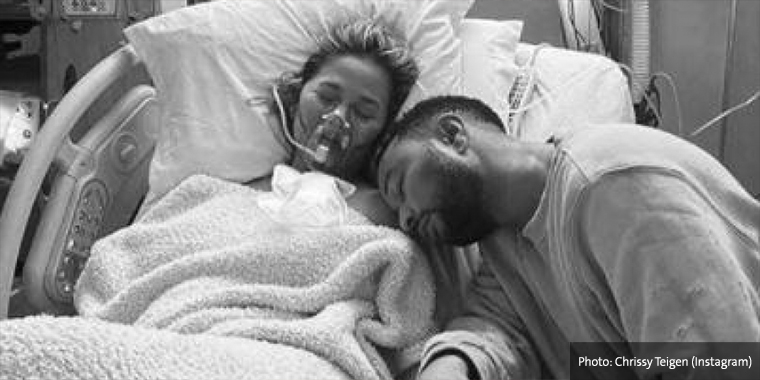Let’s Talk About Miscarriage And Pregnancy Loss

Find Your Perfect Match
Answer a few questions and we'll provide you with a list of primary care providers that best fit your needs.
The loss of a child during pregnancy can happen for many reasons and at any time. The one thing you may not know? Miscarriage is common.
Yet a stigma of shame often surrounds pregnancy loss. Photos posted by Chrissy Teigen and John Legend about the Oct. 1 loss of their third baby help normalize an event many mothers and families experience.
To learn more about pregnancy loss and how couples and families navigate through, Premier Health Now talked with Sharon Orozco, MS, RNC-OB, IBCLC, nurse navigator at the Fetal to Newborn Care Center at Miami Valley Hospital.
“When I saw the pictures of Chrissy and John holding their baby, I thought it was wonderful,” Orozco says. “It’s what we encourage. People don’t realize it really is normal, helpful and healthy.”
More Common Than You Think
The lack of open discussion hides how frequently pregnancy loss and miscarriage occur.
“Loss is very common,” Orozco says. “It is part of what we have to deal with and help families deal with.”
October is Pregnancy and Infant Loss Awareness month. There are 2.6 million stillborn babies each year, says the World Health Organization.
Miscarriage occurs in up to 25 percent of known pregnancies, says the American Pregnancy Association. Most miscarriages take place in the first trimester. That’s why many women do not share news of a pregnancy until they are 10 or 12 weeks pregnant.
Sometimes families know about a baby’s life-limiting condition or pregnancy complications. Other times a normal, healthy baby and pregnancy takes an unexpected turn.
The team at the Fetal to Newborn Care Center starts working with families when there is a diagnosed anomaly or the baby is expected to be premature, Orozco says.
Planning For Loss
If your unborn baby faces serious complications, your care team wants to hear and honor your wishes for your child.
At Premier Health, the fetal care team works with any situation, Orozco says. A pregnancy may go to term, but the baby’s life may last only minutes or hours. A baby may be able to go home but won’t be able to grow up. Or a baby may be stillborn.
You and your family take part in a palliative care conference with the fetal care team. You learn about:
- Care options for your child at birth
- How you and family members can spend time with your baby
- Memory making with your baby
- Photos with your baby
“We spend a lot of time listening,” Orozco says. “Every family is different. Whatever they want those minutes and hours to be like, we strive to make that happen.”
Planning for a baby’s potential loss gives couples and families time to think about their options and feel comfortable with finding ways to honor their child.
Making Memories, Taking Photos
“Even after the baby passes, we encourage parents and families to spend time with their baby,” Orozco says.
Grandparents, close family, and siblings are welcome and encouraged to come spend time with the baby.
“When someone else has met your child, it makes him more real,” Orozco says. “You feel less alone when you are grieving.”
Bereavement photos with your child may sound unusual but they often become beautiful mementos. Professional photographers are on call at Premier Health to provide this service. Orozco says photos are encouraged even for the tiniest of babies, even if families don’t want to look at them right away.
Memory making options include:
- Adding baby’s footprints to a family Bible
- Making Christmas ornaments with baby’s footprints on them
- Making molds of your baby’s face, feet and hands
- Preserving locks of baby’s hair
- Simply spending time cuddling your baby
“Lots of couples keep their baby with them for a day or two,” Orozco says. “It may sound strange to some, but it’s your only time with your baby, and it’s normal for dealing with the loss.”
Special bassinets equipped with cooling pads keep your baby cool and preserve a natural look.
“Many couples don’t know what they will want until they go through a loss,” Orozco says. “We give them permission to change their minds and ask for that they want.”
Dealing With Baby’s Loss
There are times when a baby’s death is unexpected. When that occurs, the labor and delivery nurses provide couples and families with the same memory making, photo, and bereavement services.
“The same nurses who are skilled in birth are also skilled in loss,” Orozco says.
Families can access bereavement support from Premier Health’s HEAL (Help Endure a Loss) program, Sufficient Grace Ministries, and by working with a bereavement doula. There are many resources and online support groups available such as the Courageous Parents Network.
In many ways, dealing with the loss of a newborn is similar to handling the loss of a loved one who lived a full life. We want to have photos and mementos of the time shared.
“We don’t want our families to have any regrets,” Orozco says. “The time with their baby is limited. We want them to feel they did everything they could do for their baby, spent special time together and had people meet their baby.”
Eventually, the lost child finds a place in their family that’s right for them.Find Your Perfect Match
Answer a few questions and we'll provide you with a list of primary care providers that best fit your needs.
Sources: Sharon Orozco, MS, RNC-OB, IBCLC, Nurse Navigator, Fetal to Newborn Care Center; World Health Organization; American Pregnancy Association





